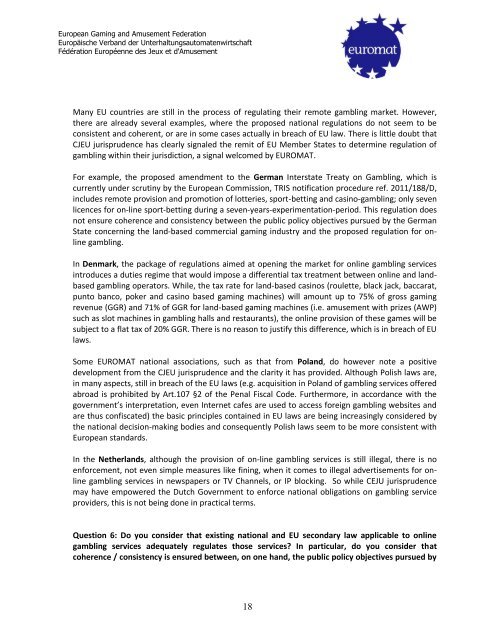Proposed structure of the EUROMAT response to the ... - Jogo Remoto
Proposed structure of the EUROMAT response to the ... - Jogo Remoto
Proposed structure of the EUROMAT response to the ... - Jogo Remoto
Create successful ePaper yourself
Turn your PDF publications into a flip-book with our unique Google optimized e-Paper software.
European Gaming and Amusement Federation<br />
Europäische Verband der Unterhaltungsau<strong>to</strong>matenwirtschaft<br />
Fédération Européenne des Jeux et d'Amusement<br />
Many EU countries are still in <strong>the</strong> process <strong>of</strong> regulating <strong>the</strong>ir remote gambling market. However,<br />
<strong>the</strong>re are already several examples, where <strong>the</strong> proposed national regulations do not seem <strong>to</strong> be<br />
consistent and coherent, or are in some cases actually in breach <strong>of</strong> EU law. There is little doubt that<br />
CJEU jurisprudence has clearly signaled <strong>the</strong> remit <strong>of</strong> EU Member States <strong>to</strong> determine regulation <strong>of</strong><br />
gambling within <strong>the</strong>ir jurisdiction, a signal welcomed by <strong>EUROMAT</strong>.<br />
For example, <strong>the</strong> proposed amendment <strong>to</strong> <strong>the</strong> German Interstate Treaty on Gambling, which is<br />
currently under scrutiny by <strong>the</strong> European Commission, TRIS notification procedure ref. 2011/188/D,<br />
includes remote provision and promotion <strong>of</strong> lotteries, sport-betting and casino-gambling; only seven<br />
licences for on-line sport-betting during a seven-years-experimentation-period. This regulation does<br />
not ensure coherence and consistency between <strong>the</strong> public policy objectives pursued by <strong>the</strong> German<br />
State concerning <strong>the</strong> land-based commercial gaming industry and <strong>the</strong> proposed regulation for online<br />
gambling.<br />
In Denmark, <strong>the</strong> package <strong>of</strong> regulations aimed at opening <strong>the</strong> market for online gambling services<br />
introduces a duties regime that would impose a differential tax treatment between online and landbased<br />
gambling opera<strong>to</strong>rs. While, <strong>the</strong> tax rate for land-based casinos (roulette, black jack, baccarat,<br />
pun<strong>to</strong> banco, poker and casino based gaming machines) will amount up <strong>to</strong> 75% <strong>of</strong> gross gaming<br />
revenue (GGR) and 71% <strong>of</strong> GGR for land-based gaming machines (i.e. amusement with prizes (AWP)<br />
such as slot machines in gambling halls and restaurants), <strong>the</strong> online provision <strong>of</strong> <strong>the</strong>se games will be<br />
subject <strong>to</strong> a flat tax <strong>of</strong> 20% GGR. There is no reason <strong>to</strong> justify this difference, which is in breach <strong>of</strong> EU<br />
laws.<br />
Some <strong>EUROMAT</strong> national associations, such as that from Poland, do however note a positive<br />
development from <strong>the</strong> CJEU jurisprudence and <strong>the</strong> clarity it has provided. Although Polish laws are,<br />
in many aspects, still in breach <strong>of</strong> <strong>the</strong> EU laws (e.g. acquisition in Poland <strong>of</strong> gambling services <strong>of</strong>fered<br />
abroad is prohibited by Art.107 §2 <strong>of</strong> <strong>the</strong> Penal Fiscal Code. Fur<strong>the</strong>rmore, in accordance with <strong>the</strong><br />
government’s interpretation, even Internet cafes are used <strong>to</strong> access foreign gambling websites and<br />
are thus confiscated) <strong>the</strong> basic principles contained in EU laws are being increasingly considered by<br />
<strong>the</strong> national decision-making bodies and consequently Polish laws seem <strong>to</strong> be more consistent with<br />
European standards.<br />
In <strong>the</strong> Ne<strong>the</strong>rlands, although <strong>the</strong> provision <strong>of</strong> on-line gambling services is still illegal, <strong>the</strong>re is no<br />
enforcement, not even simple measures like fining, when it comes <strong>to</strong> illegal advertisements for online<br />
gambling services in newspapers or TV Channels, or IP blocking. So while CEJU jurisprudence<br />
may have empowered <strong>the</strong> Dutch Government <strong>to</strong> enforce national obligations on gambling service<br />
providers, this is not being done in practical terms.<br />
Question 6: Do you consider that existing national and EU secondary law applicable <strong>to</strong> online<br />
gambling services adequately regulates those services? In particular, do you consider that<br />
coherence / consistency is ensured between, on one hand, <strong>the</strong> public policy objectives pursued by<br />
18



